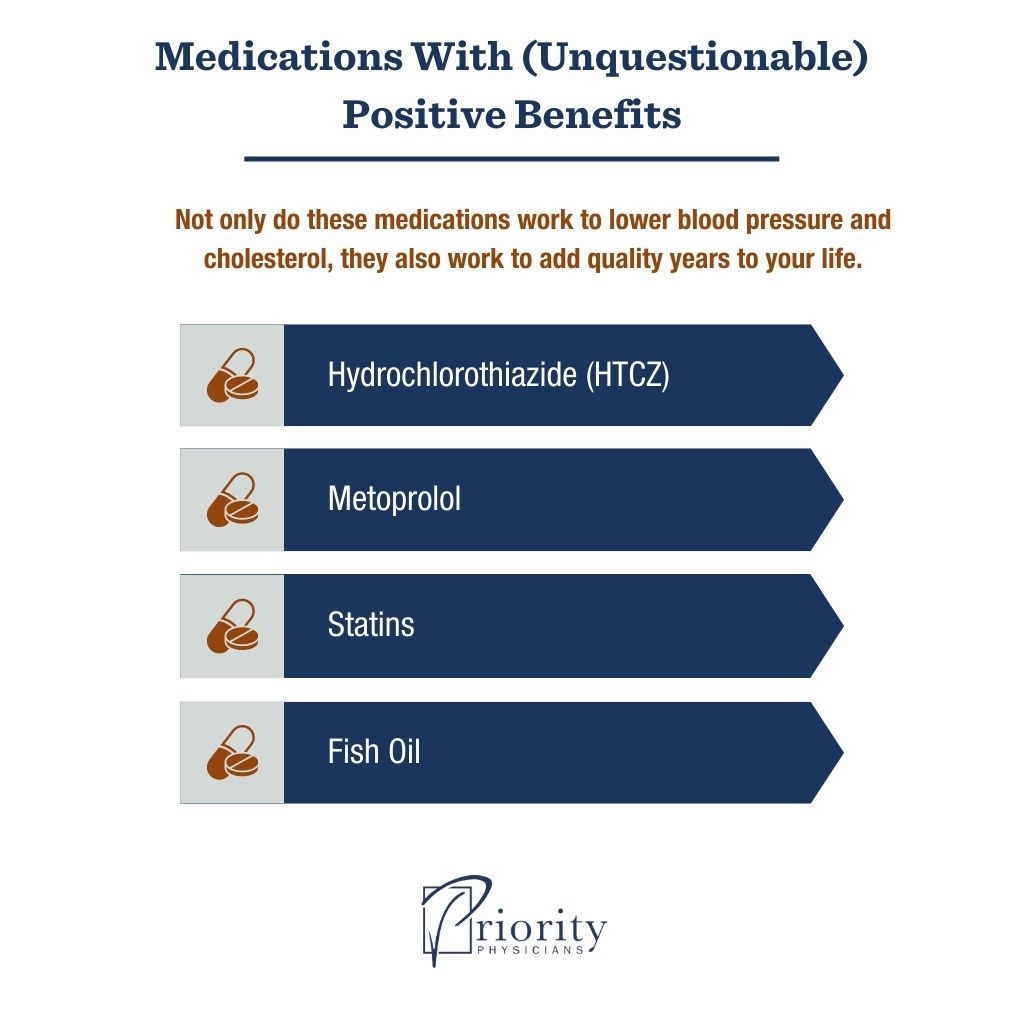When we recommend a medication, we sometimes hear responses like:
- “I’d rather take a holistic approach.”
- “I’d like to wait a while before getting on medication.”
- “I don’t like taking medicine.”
A lot of people have become much more hesitant about taking medicine in recent years. Maybe they’ve Googled a recommended medication and found worst-case-scenario horror stories online. Or maybe they’d rather try diet and lifestyle changes to resolve their health issue.
Here at Priority Physicians, we’re not advocates of piling on the pills or taking unnecessary medicine. Taking too many medications at once greatly increases a person’s risk for drug interactions — a risk that reaches 100% at eight or more drugs! So we absolutely support patients making diet and lifestyle changes to improve their health, and if it works, we celebrate the chance to avoid adding a pharmaceutical to the mix.
That said, we also recognize that not every health issue can be resolved through lifestyle. Certain conditions, like high blood pressure, cause damage to the body if left untreated. If after six months to a year of lifestyle changes a patient’s condition doesn’t improve, we have to do something before they suffer irreparable damage.
We understand people worry about the side effects of medication. We’re not saying those don’t exist. What we’re saying is that not taking medicine has side effects, too. And, depending on the case, these can be far worse.
In this post, I want to give a physician’s perspective on this issue and why — in certain circumstances with certain ailments — medication really is the best choice.
You Haven’t Failed by Taking Medicine
If you’re one of the many people who’ve said at some point in their lives, “I don’t like taking medicine,” you may feel like it’s a failure to cave and fill a prescription.
It isn’t.
Many people don’t want to take medicine because they feel their health would be better without pharmaceutical companies interfering with their bodies. But if something in their health gets beyond their control, it’s not a moral failing to be open to the only thing that can make a difference, and perhaps save their life.
Every human being is different. Some people are going to have more trouble with certain health issues than others, regardless of how healthy their lifestyle is. Maybe you’ve taken care of your body with a good diet and exercise for years. You take supplements and practice yoga, but your cholesterol levels paradoxically get out of control. You might have a genetic predisposition to high cholesterol.
No amount of supplements will fix that. But a statin can.
Unlike supplements, medicines are heavily regulated and have to prove their effectiveness. We know exactly what to expect from them, and we know when the risks of minor side effects from a medicine pale in comparison to the risks from a serious health condition. If a heart attack is the potential side effect of not taking a medicine, that far outweighs a risk of indigestion.
Which Medications Have (Unquestionable) Positive Benefits?
An important note on medicines: We’re not just interested in drugs that improve your numbers. We’re interested in medicines that actually contribute to the outcome we’re after — a high-quality, long life.
Several medicines for cardiovascular issues, like high blood pressure or cholesterol, have proven their unquestionable positive health benefits. So even if you’re still in the “I don’t like taking medicine” camp, we recommend remaining open to the medications below if your doctor believes you need them. Lengthy studies have shown that all of these both improve specific numbers AND add years to your life.
Hydrochlorothiazide (HTCZ)
Hydrochlorothiazide, also known as HTCZ, is a diuretic used to treat high blood pressure and fluid retention. It causes your body to eliminate more salt and water through urination.
By lowering your blood pressure, you decrease your chances of dying from a heart attack or stroke.
Metoprolol
Metoprolol is a drug used to treat high blood pressure, chest pain, and heart failure. It works to slow the heartbeat, allowing the heart time to rest between beats. The better you can keep your heart from wearing out, the longer it will last.
Statins
Statins like Lipitor and Crestor work to lower cholesterol and reduce the risk of illness and mortality in people who are at a high risk of cardiovascular disease. Statins also have some anti-inflammatory properties, which can reduce the risk of developing certain additional diseases.
Another interesting property of statins is that they can actually cause plaque regression. This means that they can help your body reabsorb plaque that’s already built up in your arteries. No diet or exercise (or supplement) can do this.
Fish Oil
Studies have shown one supplement in particular makes a remarkable difference in cardiovascular health: fish oil. Quality fish oil supplements, especially when taken with a statin, can improve many health factors and significantly reduce a person’s risk of dying. However, please always talk to your doctor before starting a new supplement — because supplements like fish oil have side effects too.

How Do Concierge Doctors Differ From Conventional Doctors When Prescribing Medicine?
Concierge and direct primary care physicians take a different prescribing approach from conventional doctors in two ways. These two ways can sound slightly contradictory, but they’re really two sides of the same coin: individualized healthcare.
As a concierge doctor, I’m not following an algorithm that tells me what medications or treatments to prescribe for you as my patient. I’m looking at you as an individual, complete with your lifestyle, where you live, what you do, who you’re married to, and what your goals in healthcare are. Then I apply all that information to the way we take care of your particular health situation.
Because of this, concierge doctors can be a bit slower to prescribe medication initially, especially if you don’t like taking medicine. Instead, we coach you in lifestyle modification, provide feedback, and help you tweak your exercise regimen or diet — because we have the time and freedom to do so.
On the other hand, we can be more aggressive in treating issues like cardiovascular disease because we have access to additional and more advanced testing. Most doctors are still just doing a basic lipid panel to screen for heart disease; they’re not looking at the advanced cardiovascular disease markers that concierge doctors are monitoring.
By having the time, freedom, and up-to-date science and techniques, concierge doctors can spot disease a lot earlier and begin treating it more aggressively sooner. If we discover a problem is building and not going away, we’ll prescribe the medicine with the best track record not only in treating that particular problem but also in producing the goal we’re after — a long life for you.
If a concierge or DPC doctor recommends a medication for you, it’s because — according to our in-depth, advanced testing and professional evaluation of your individual health — you need it. We don’t get kickbacks from pharmaceutical companies to prescribe specific medications (that era has been over for some time anyway), and anything we recommend is something we’d take ourselves.
In fact, whether you’re seeing a concierge, DPC, or conventional doctor, you might want to ask them what medications they’re taking. You’ll find we practice what we preach, taking medications we know are proven safe and effective for improving overall health outcomes. Many of us are on a statin, for example, because of these drugs’ incredible preventative effects.
The Bottom Line if You Don’t Like Taking Medicine
Taking medication is not a failure. As long as it’s warranted (and we’ll never recommend one that isn’t), taking medicine could be the best way to prolong your life and health.
We know it’s tempting to put off starting a new drug, especially if you don’t like taking medicine. But not making a decision is a decision.
It’s one thing to put off taking medicine while you try lifestyle changes in coordination with your doctor, but it’s another thing entirely to put off taking it when nothing has changed. This can completely annul the benefit of discovering disease early and shorten the window of time you have to make an effective difference in your health.
If you don’t like taking medicine, we don’t fault you. But for the sake of your health, I hope you’ll talk with your doctor, share your concerns, and be open to the possibility that a good medication could be exactly what you need to maintain a healthy, happy life.

